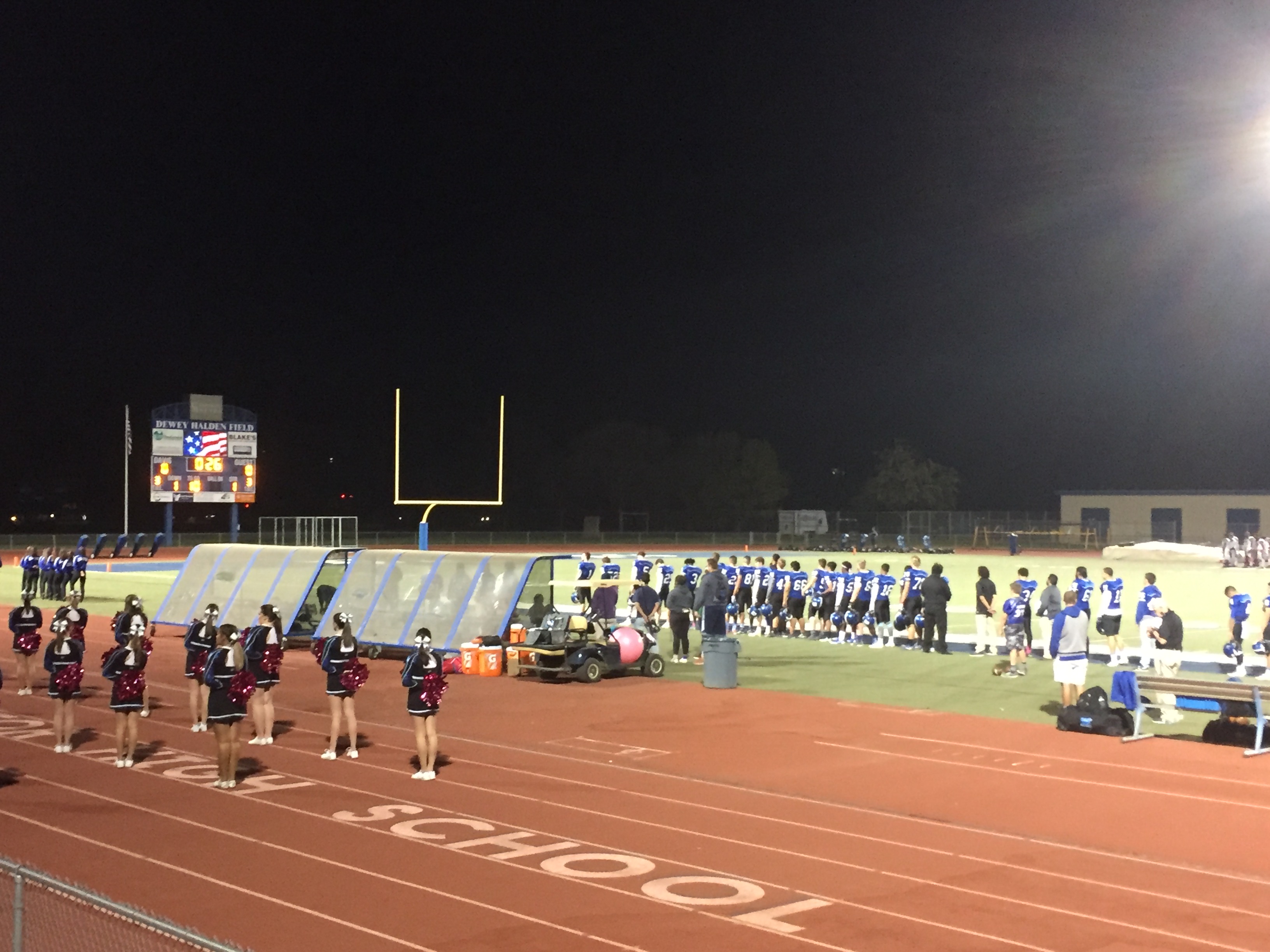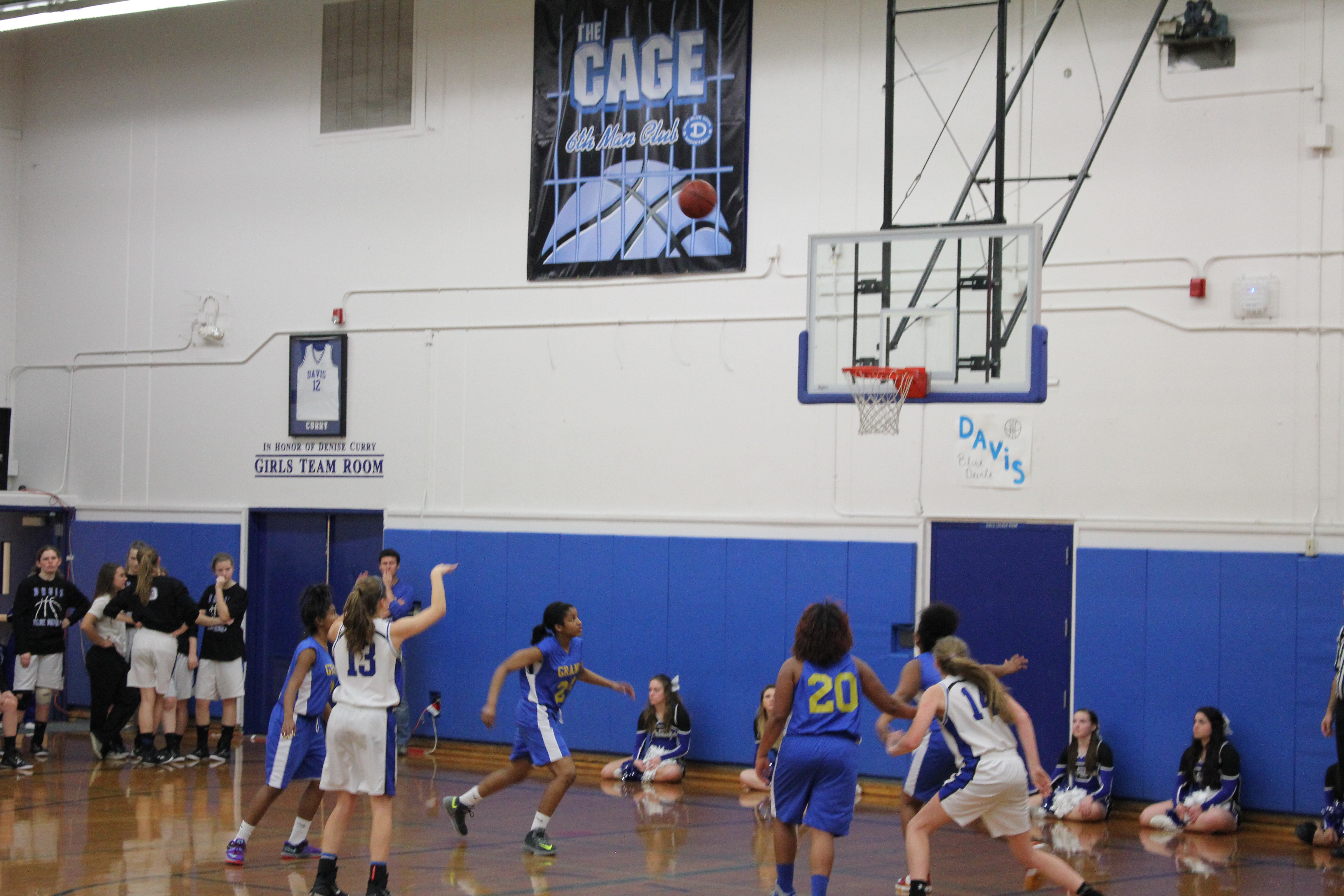Letters from the field: DHS enjoys immense success in a sport that hardly anyone understands

It’s 3:42 p.m., and I am the first one to field hockey practice. I wait, and the girls trickle in, drop their stuff on the ground and commence to do nothing.
“You’re lucky you came on a really light conditioning day,” sophomore Allie Campos says as she walks by.
I shrug. I’m not as fit as I’ve ever been, but come on, this is field hockey. I’m an athlete, true, not in top form, but an athlete nonetheless.
Ten minutes in to my “really light” conditioning workout, I’m starting to think that the double wrapped Chipotle burrito with everything on it was a mistake.
Fifteen minutes in, I’m wondering if this whole thing wasn’t a mistake. It’s become immediately apparent that I am neither the fastest, strongest nor the toughest one on the field.
Soccer with weapons.
They call it soccer with weapons. But to an outsider, field hockey seems incredibly tame; the players’ freedom to express themselves on the pitch hampered by rules that seem overly cautious.
According to forward, senior Sarah Riesenberg, many dismiss it as a game played by preppy, upper crust girls in skirts who consider themselves too genteel for soccer or lacrosse.
For one, the rules regarding obstruction are Stalinist, limiting physical contact between players to the extreme. For another, the composite fiber sticks cannot be swung above the waist and the ball cannot travel above the knee.
But, according to senior and co-captain Lauren Holtz, the rules are all in place for a reason.
“Maybe you have to play field hockey to understand, but the rules are all fair, and they were written to keep people safe,” Holtz said.
But even with the rules, danger is inherent in the game.
All the players wear shin and mouth guards, the defenders wear eye guards (“because s—- happens”) and the goalies trundle around in helmets and thick foam pads, more Optimus Prime than teenage girl.
The game is wicked fast; the ball slammed up and down the field with alarming force, and unwieldy clubs slashing over the grass with more malice than the players are willing to admit to.
Most of the game is played in a very ergonomically unfriendly hunch, an effort to lower the inconveniently short sticks to grass level and dribble the hard plastic ball.
Field hockey is, in fact, much like soccer. It is a fluid game comprised of fast, agile forwards cutting in front of goal, imposing midfielders making their presences felt and stolid defenses standing up the other team.
But if you’re still inclined to smirk, the field hockey team has one word for you: Scoreboard.
The DHS varsity field hockey team has been co-league champion both of the last two years, and have set their sights on winning league this year.
“We’re a scoring machine up front,” Holtz said. The varsity team has scored 68 goals, and a miserly back line has yielded only seven goals to opposing teams.
If there was ever a year to do it, it’s this year.
They’re closing on the scoring record, set in 1993, by none other than the team that Katy Loge, the current varsity coach, played for as a sophomore at DHS.
“We’re definitely going to break it,” Holtz said. “For sure.”
But Loge worries that her team will start playing mind games with themselves. After a loss to archrival Chico, one more loss would more than likely cost them the league title altogether.
Because field hockey is such a niche sport on the west coast, DHS does not belong to a section, only a league.
“We can’t have an eight loss season, go to the playoffs and wipe the slate clean. We can never claim that ultimate title,” Loge said.
For her and her team, the league title is all they have, and every game, the stakes are high.
More than Meets the Eye
We’ve transitioned from conditioning to drills. Stick and ball work. I find out immediately that the stick is not the most precise and intuitive medium through which to communicate with the ball.
The first task was to straight dribble, essentially pushing the ball up the field with the stick. Simple enough. Or not. I lost the ball too many times to count, and as the drills got more and more complex and I got more and more flustered, things got worse.
I was consistently the last person to finish every drill we did. The team cheered me on and congratulated me when I finished, offering pointers and back pats.
Everywhere I turned, there was a “good job,” “keep it up,” “or here, try this, it’ll help.” Seniors Katherine Eadie and Sarah Riesenberg were assigned to baby sit me. I’d officially become the worst field hockey player there.
At first the girls laughed, even the J.V. girls practicing on the other side of the field. That was embarrassing. But soon the laughter stopped. At some point, a thing becomes so pitiful that laughing at it is just wrong.
Ties that Bind
The varsity women are a close-knit bunch, and they hang out as a team often to make sure that they stay that way. There’s team lunch, team dinner, team frozen yogurt, team bike rides and something called “Olympics,” which was never fully explained, but somehow involves dressing up as psychotic clowns, old people and produce products.
Most of these things – the bike rides, the “Olympics,” – are traditions. And the field hockey team is long on tradition.
“It’s a really large part of what we do, and whenever I put on the jersey, I think about all the others who have played for Davis before me. The alumni are always calling to see how we’re doing,” Holtz said.
The alumni network is “well connected” according to Loge, and every year there is a well attended alumni game for past players.
The day that I practiced with the team, Loge read a portion of a letter from a DHS field hockey alumnus to them. The letter talked about the sacredness of team, and how important the relationships they were forming with one another would be to them, even years later.
I felt then, as I would feel multiple times afterwords, that I was intruding on something more than a team’s practice, it felt like I had been allowed into something much more akin to a family.
Loge herself is a product of the program, and went to UC Berkeley on a hockey scholarship before transferring to UC Davis. As a student at UCD, she often found herself coming back to Susan Beaton Field, named after her old varsity coach, to help out with practices.
In 2002, Loge was approached about coaching the varsity team.
“I said ‘No thank you’,” she said.
But she did sign on to coach J.V. for one year and one year only. Nine years later she’s still there, now coaching varsity.
“You just remember how much you love it,” Loge said. “You meet new kids, and you get attached. You always say, ‘All right, I’ll just see this group through, and then I’ll leave,’ but a new group comes along and you get excited about them. It’s really hard to leave.”
Rachael Mack, herself a former DHS field hockey player, now a freshman at UCD, is now the assistant varsity coach. And though she doesn’t know whether or not she’ll stay on after colleges, she does pause to consider.
“I don’t know,” she said. “But I really like it.”
According to Loge, this team stands out, even compared to the championship teams of years past.
Loge says that in her nine years of coaching at DHS, the last five of which have been at the varsity level, this year’s squad is “not only physically and skill-wise the best,” but also has the best understanding of “team.”
Wrapping up
Practice is over, and the girls start packing their things away. I go over to talk to the coach. She smiles.
How’d I do coach?
“I’ll get you a field hockey shirt, you can be an honorary member,” she says.
I’ve never been cut from a sports team before, but this has to be as gentle as it gets.
My mentor Eadie stops to offer her condolences. “You did good today,” she says with great compassion. “Not everyone can keep up.”
The sun is setting behind the trees, and the sky looks painted. The practice is slow in breaking up, and the J.V. team will be working for another hour – after all, next year, they’ll be custodians of a long standing tradition of DHS dominance on the field hockey pitch.
Meanwhile, the seniors have one more tradition to teach to the sophomores on varsity team: on homecoming week, they get TPed. The seniors will be free to have a fun night, because, even though they don’t know it yet, the next day’s practice is canceled. The team’s been working hard all year. They deserve it.



